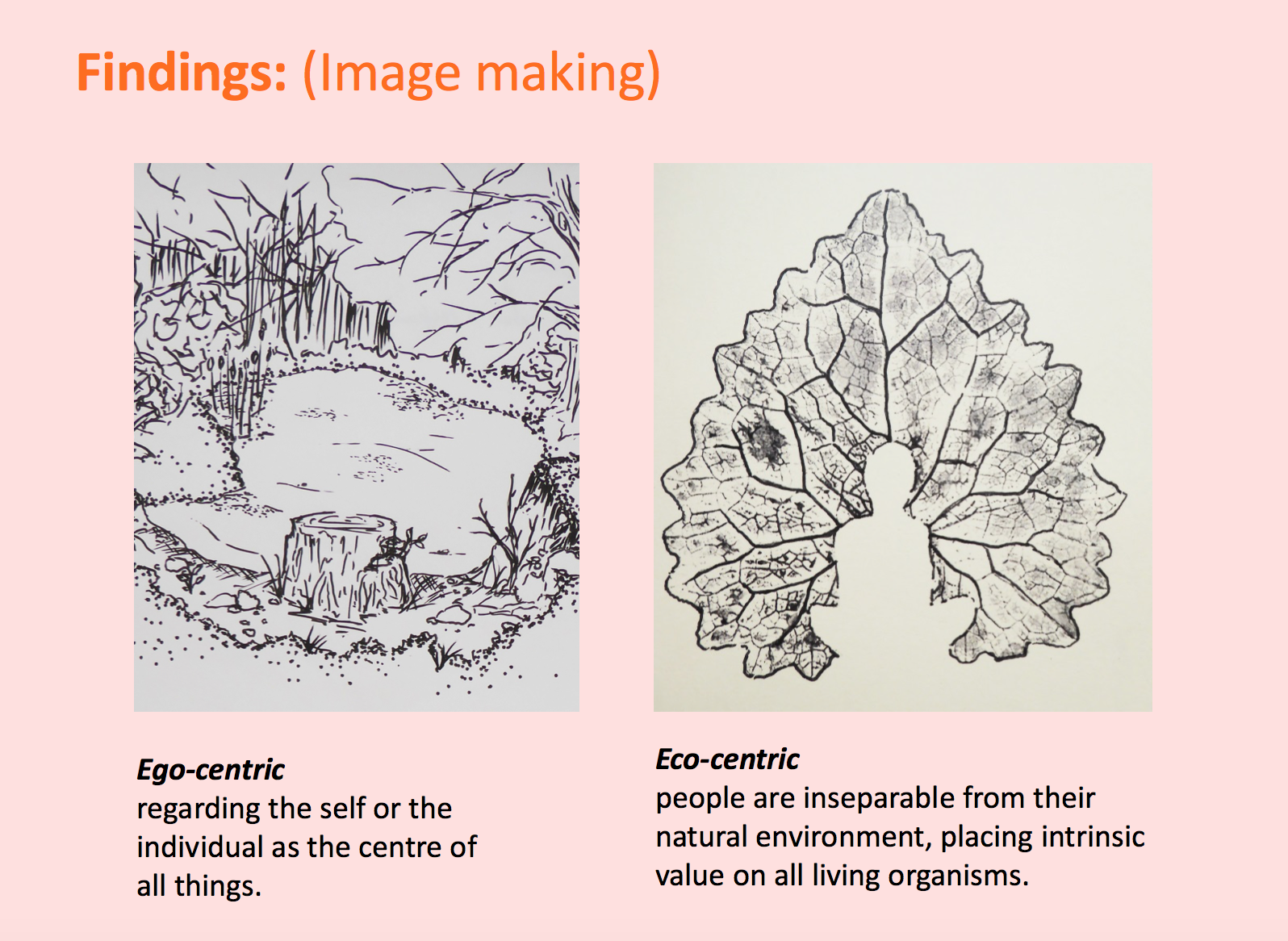Findings
Questionnaire data was collected before and after the project, interviews
were conducted asking about student’s expectations,
experience, learning and present perception of their experience. Data was
analysed using thematic analysis (Braun & Clarke, 2006) and visual
methodologies
(Frith et al., 2005).
Below are two bar charts showing the most pronounced shifts in perception/thinking.

During the project, students transitioned from a general ego-centric perspective (regarding the self as the centre of all things) to a more eco-centric one (people are inseparable from their natural environment). This was evident in the way they chose to visualise natural spaces from memory (colourful and anthropocentric), compared to how they visualised nature from experience (muted and minimal evidence of humans), and to the final product (representing human-nature relationship). The change in visual language correlated with the change in attitude captured by questionnaires, writing and interviews.
The image below most starkly illustrates the transition visually:

Interviews:
The table below illustrates the themes and
codes created through thematic
analysis of student interviews.

The findings illustrate that by the end of the project most
students had a stronger connection to nature and a desire to protect it, and
each student had one or more of the following: a greater awareness of their
place in the world, a greater understanding of the way they can develop their
visual communication practice to benefit community, increased awareness of
lifestyle and resource and a stronger sense of their own professional and
personal identities. Most students felt calm and relaxed during the nature
solo and
a proportion of
students also actively decided to consciously ‘use’
experiences in nature to soothe their anxieties and stress during and after the
project, suggesting nature solos benefit wellbeing. The solo and project also
promoted positive self-reflection supporting improvements in confidence and
understanding of self. Every stage of the project challenged students’
expectations in differing ways and resulted in establishing changes in
students’ attitudes, behaviour, creative
approaches and career goals.
Social recommendation:
Form or nurture our relationship with nature - connect to nature by ‘be’ing in nature and notice nature around you as regularly as possible. Make the time to do this. Reflect and act (individually and collectively) to protect nature, heal the planet and, ultimately, change the way we relate to, work with and use nature in our everyday lives and in the world.
Form or nurture our relationship with nature - connect to nature by ‘be’ing in nature and notice nature around you as regularly as possible. Make the time to do this. Reflect and act (individually and collectively) to protect nature, heal the planet and, ultimately, change the way we relate to, work with and use nature in our everyday lives and in the world.
Educational recommendation for HE:
To include an education for sustainable development project in all curriculums where possible and the project not to be an opt in process as the students who had less interest in nature to start with had more of a transformative experience and outcome.
To include an education for sustainable development project in all curriculums where possible and the project not to be an opt in process as the students who had less interest in nature to start with had more of a transformative experience and outcome.
Reflections about the nature solo (BE)
“For that hour you had no purpose in some sense. You didn’t have any jobs to run or any emails to send and that, for me, was quite a shock. I really struggled with it which completely contrasted with the beginning phase…
…Because I like to keep busy, just being out in the wilderness with nothing around was like, blimey, this is really difficult…”
“For that hour you had no purpose in some sense. You didn’t have any jobs to run or any emails to send and that, for me, was quite a shock. I really struggled with it which completely contrasted with the beginning phase…
…Because I like to keep busy, just being out in the wilderness with nothing around was like, blimey, this is really difficult…”
Influence of the experience (NOTICE)
“I went back out to Stanage Edge recently and it was completely different because I’d had that experience and I’d been able to learn from it. That, for me, was the most memorable part of it… It’s actually given me more confidence to go out and do that kind of thing more. It’s made me realise that nature is a really massive part of our lives and you can’t just hide in the city and stay away from it all…”
“I went back out to Stanage Edge recently and it was completely different because I’d had that experience and I’d been able to learn from it. That, for me, was the most memorable part of it… It’s actually given me more confidence to go out and do that kind of thing more. It’s made me realise that nature is a really massive part of our lives and you can’t just hide in the city and stay away from it all…”
Influence on visual communication practice (ACT)
“I respect nature more, I’m more aware of being eco-friendly and being so close to the Peak District, how valuable that is to Sheffield and keeping that nature safe… It made me much more aware about its role in our lives and how important it is. It’s given me a different way of thinking and a different level of confidence... as a practitioner to approach things I’m not confident with.”
“I respect nature more, I’m more aware of being eco-friendly and being so close to the Peak District, how valuable that is to Sheffield and keeping that nature safe… It made me much more aware about its role in our lives and how important it is. It’s given me a different way of thinking and a different level of confidence... as a practitioner to approach things I’m not confident with.”